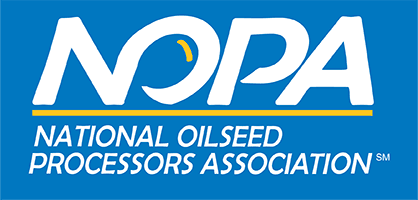NOPA Makes Case to USDA for Domestic Feedstocks & Timely Issuance of 45Z Rules
Domestic Feedstock Requirement Will Ensure 45Z Works for U.S. Farmers and Crushers
WASHINGTON, Oct. 16, 2024 – National Oilseed Processors Association (NOPA) President & CEO Kailee Tkacz Buller yesterday urged the U.S. Department of Agriculture (USDA) to support the vital role U.S. agricultural feedstocks can play in decarbonization efforts by adopting and properly incentivizing climate-smart agriculture practices.
In comments delivered during a public consultation on climate-smart biofuels feedstocks, Buller stressed the importance of a domestic feedstock requirement for the Section 45Z Clean Fuel Production Tax Credit. Amid increased imports of waste feedstocks that have eroded soybean oil values and driven down both crush margins and farm gate prices, such a requirement would both address climate change and promote American job creation as the Inflation Reduction Act (IRA) intended.
“By enforcing a domestic requirement in 45Z implementation, expanding the number of eligible oilseeds and climate-smart agriculture practices, and ensuring timely rulemaking, USDA in conjunction with other federal agencies can ensure a sustainable, forward-thinking policy that benefits the American farmer, American producers, and downstream users of these sustainable fuels that provides integrity to U.S. taxpayers,” Buller said.
With over 5 billion gallons of biomass-based diesel being produced annually, delays in the rulemaking process have already created uncertainty in the marketplace and continue to hamper the industry’s ability to plan. It is critical that Treasury issues its 45Z rulemaking as soon as possible.
Buller also emphasized the need for scrutiny, oversight, and traceability to ensure the integrity of biofuels programs calling for origin disclosure verification while supporting paperwork and in-person audits as well as testing. She encouraged USDA Animal and Plant Health Inspection Service (APHIS) to consider additional rigor in its attestation-based approval process for health permits and registrations of Used Cooking Oil and tallow imports.
“45Z should unbundle climate-smart agriculture practices, increase the number of eligible climate-smart agriculture pracites and eliminate the requirement for direct contracts between farmers and fuel producers because this does not reflect real-world conditions for agricultural supply chains,” Buller said.
NOPA members have made $6 billion in investments to expand U.S. crushing capacity. However, absent these changes, current market conditions and a lack of certainty on biofuel issues are calling these investments into question.
Read More:
- Public Comments Provided Verbally to USDA
- NOPA to USDA: Feedstocks from U.S. Oilseeds Offer Significant Decarbonization Opportunities and Should Not Be Left Behind
###
Organized in 1930, the National Oilseed Processors Association (NOPA) represents the U.S. soybean, canola, flaxseed, safflower seed, and sunflower seed-crushing industries. NOPA’s membership is engaged in the processing of oilseeds for meal and oil that are utilized in the manufacturing of food, feed, renewable fuels, and industrial products. NOPA’s 17 member companies operate over 70 softseed and soybean solvent extraction plants across 21 states, crushing over 95% of all soybeans processed in the United States, the equivalent to more than 2 billion bushels annually. More information at www.NOPA.org

